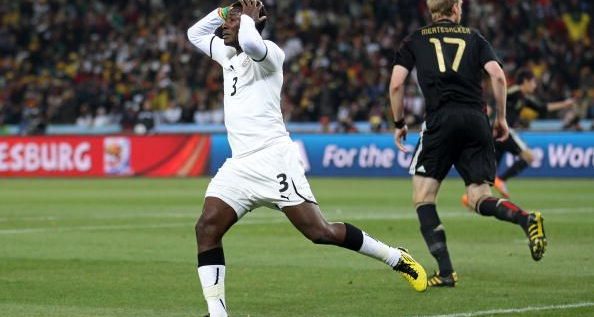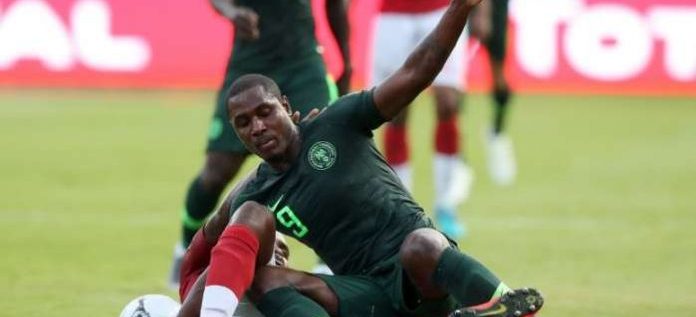Why Africa Hasn’t won The FIFA World Cup

![]()
The 2018 World Cup soccer tournament is ongoing in Russia, with 5 African countries among the initial competitors. In the worst continental performance for decades, all African contestants have failed to make it past the first round of this tournament. Regardless of sentimental considerations about how well Africa’s representatives have played to no avail, it is nevertheless a shame that fairly a long time after African soccer at the World Cup showed a lot of promise; no African country has yet justified being considered a favorite to win the tournament!
After the impressive performance of the Cameroonian national team at the 1990 World Cup, soccer legend Pele felt confident enough to predict that an African country will win the tournament before the turn of the 20th century. Indeed, Pele should have been more cautious on the subject, if only because the World Cup quarter-final reached by Cameroon may simply have meant Cameroon was no better than being the 6th or 7th strongest team in the tournament, which is still a long way from being the best!
To date, 28 years after the prediction, no African nation has reached the World Cup semi-final, not to talk of the final! This is somewhat disconcerting because an Asian country, South Korea, reached the tournament’s semifinal in 2002, despite the fact that Asia has less world cup slots than Africa. Africa by now ought to be doing significantly better than Asia and North America in World Cup performances, even if surpassing the Europeans and South Americans is still understandably a challenge!
When one considers the number of African players who have made great accomplishments in the round leather game, such as George Oppong Weah, Samuel Etoo, Abedi Pele, Didier Drogba and countless others, the gap between individual and national team success is perplexing.
Why has Pele’s prediction failed to come true? Some reasons for this are quite obvious, while others require below the surface analysis. Most are down to Africans’ administration of their football.
Many African teams go into the world cup with the naïve mindset that they will do very well simply because they have a bundle of highly individually talented players. What they still seem not to have realized till date is that the more advanced soccer nations have acquired the ability to seriously limit the effectiveness of brilliantly creative players of opposing teams, while on the other hand creating highly effective tactically sound soccer teams that do not need every player to be a wizard with the ball. The top European and South American teams need not more than 2 or 3 really gifted creative players on the pitch at any time, with the rest of the team just focused on perfectly implementing their manager’s tactics, particularly defensive tactics.
It is noteworthy that none of the last 3 World Cup winning teams had a player that was generally considered the very best player in the world in their ranks when the won, at least not in the same way as Brazil had Pele going into the Mexico 1970 and Argentina had Maradona going into Mexico 1986.
African teams at the world cup must rely less on individual brilliance and more on tactical intelligence, mental discipline, organization, commitment, and cohesion.
Brilliant players are still needed, but African teams must have a plan B when they these players are heavily marked by opposing teams. They must also be able to tactically and psychologically reduce the impact of the top players of the European and South American teams (most importantly) in matches played against them.
The Cameroonian side, including Roger Milla, that was able to achieve an African record of 5 consecutive matches in 2 separate world cups without conceding defeat was not that much a breathtakingly creatively gifted side in a real sense!
When compared to European and South American world cup sides, most African teams to the world cup build up their attack slowly, making it easier for the bigger teams to organize defense.
Jose Mourinho, already arguably one of the most controversial yet successful soccer managers of all time, said something a while back to the effect that any team playing very modern soccer must be set up to counter attack effectively if it wants to be successful.
The Italians highlighted the trend to come with their winning Catenaccio plus Counter Attack in 1982.
Less than 8 years ago, it was statistically confirmed that some top club sides in Europe score almost 20% of their goals from counter attacks alone.
Because today’s soccer defenses at the highest level are so well organized, a significant percentage of real goal scoring opportunities now come from defending well and quickly identifying temporary openings in the opposition’s defense that can emerge while they are attacking. A team relying on regular goals and set pieces is limited.
Because the typical African team at the world cup has been more dependent on players’ individual brilliance, such players tend to hold on to the ball longer than necessary, such that even their team’s normal build – up towards the opposing goal tend to be slower than the world cup winning standard. When such African teams get an opportunity to launch a counter attack against a team like Germany or France, the opportunity is likely to be lost because it is not quick and efficient enough.
This problem has been more pronounced with the ub Saharan African Teams. The North African Teams tend to be more efficient.
If there is any malady affecting African soccer today, it is the obsession with age grade soccer. From the 1980s, it became very obvious that African teams were thoroughly excited whenever they won an Under 17 or Under 21 FIFA world cup or an Olympic soccer tournament. The problem with these victories is that because they have been almost always won with over aged players, they give an excessively over-hyped appearance of soccer talent development that is often just a mirage.
The truth is that even a mere 2 year advantage over genuine under 17s can create a great overestimation of the offending player’s capabilities, and many African countries have been guilty of exceeding this 2 year excess! That even genuine under 17 talents may fail to achieve their potential at senior level is worthy of note.
The nations that have been winning the world cup know that the only sure way to know a truly exceptional player is to pit that player against senior level footballers. That is why the likes of Lionel Messi, Cristiano Ronaldo and Wayne Rooney would probably never have had to play in an under 17 FIFA World Cup.
It is conceivable that when a top European cub signs an Under-17 star from Africa (usually at a ‘safe’ price, they watch him closely for signs that he is significantly above the claimed age. If this seems to be the case, he must either meet and exceed the standard for the suspected real age or be placed into a sort of sandbox that guarantees that he will only play as an irregular sub until he is sold to a side of lesser standing. This may be why many of Africa’s so called foreign based professionals are either reserves at grade A teams or playing regularly or otherwise for grade B and C clubs in Europe.
It actually appears that FIFA have settled into patronizing African nations with these age grade competitions which are distracting them from focusing on developing their senior national teams and top professional soccer clubs, which is what the European and South American nations with solid soccer development programs do.
African soccer nations must pay more attention to soccer at senior level so that there is no incentive for over aged African players to deceive themselves and their countries by performing only apparently amazing feats in junior FIFA competitions only to fail to shine where it matters most, at the senior World Cup.
The next point is quite relevant to this one.
African countries are not doing enough to ensure quality output of local players and particularly managers from their domestic soccer leagues. The typical African side today at a world cup tournament hardly has up to 5 players (if any at all) playing in that country’s domestic league. Of the 5 African qualifiers for the 2018 World Cup, only 2 have 4 players or more playing in their domestic league. None have up to 10! In contrast, all of the last 3 world cup winners have been made up of mostly their domestic league players. Even the South Americans, who tend to migrate more because soccer in Europe is more lucrative, have produced their most recent world cup winning squads mostly from players in the Argentine and Brazilian leagues respectively.
It may be a truth that many African countries cannot possibly produce domestic players of the same quality as Germany, Spain and Italy. However, what must be recognized is that if Africa’s home based players know that playing good football for a top domestic side gives them a good chance of making it into their country’s team to the world cup, many of these players would be willing to take the risk of delaying their sojourn abroad until after they have achieved enough with their domestic club/clubs to earn a national team shirt rather than either going to play second or third tier roles in foreign clubs or going to second tier soccer leagues with only money as the motivation.
The previously highlighted problem of age fraud may partly be because many of Africa’s home based players feel they can only gain recognition at home by playing in age grade teams.
Rather than have a very few home based players battling to make in into their national team (world cup inclusive) squads, African teams should have a quota of not more than 11 foreign based players in every world cup squad. Rather than using so many home based players in world cup qualifiers only to replace almost all of them with second rate foreign based professionals in a world cup bound squad, the foreign based pros should know they are competing against themselves for a limited number of slots in the world cup bound team.
The current African Nations Championship which features only domestic league players in Africa should gain more importance in the African game!
At the 1982 World Cup, Africa only lost one match out of 6. The 2 teams that represented the continent at that tournament (Raber Madjer’s Algeria and Roger Milla’s Cameroon) are still legendary till today. It is noteworthy that both teams were made up largely of domestic talent! Raber Madjer, George Weah and Finidi George seem to be great evidence that a player who has proven himself as a senior level talent in Africa has a brighter future in Europe than when that is not the case.
At the managerial level, it is quite an intriguing statistic that no country has ever won the world cup with a foreign manager! While this does not suggest that foreign managers cannot possibly bring about world cup success (Greece won the 2016 Euro Tournament with one), it shows that the ultimate level for every aspiring world cup winning nation is the ability to raise world class managers at home!
This is a legendary problem with African football. Yes, Africa has produced great strikers and not all African countries are terrible at scoring goals, but on the most part, Africans at the world cup are deficient in the final third; in the crucial assist and in the shot on (or usually off) target.
It is not that Africa lags behind the whole world in this department. It is that Africa still lags behind Europe and South America, who still dominate the World Cup!
Most if not all African countries are excited and elated to reach the quarter-final of a world cup. While this is somewhat understandable, it creates a psychological barrier against victory over those nations that would consider a quarter-final, or even a semi-final, a total or partial failure. For the countries that have dominated the world cup, particularly Brazil, Germany, Italy, Argentina and lately France, anything less than victory is considered a failure at least to some extent.
Only those nations that want nothing less than victory at a world cup tournament actually win or come very close to winning!
Culled




